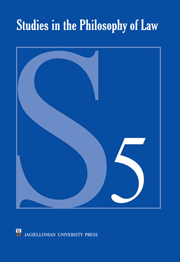Book contents
- Frontmatter
- Contents
- Preface
- I Legal Implications of Medical Advances
- II Evolutionary Approach to the Normativity of Law
- 5 Some Remarks on the Naturalization of Law
- 6 Revisiting ‘Equality in Exchange Revisited’: Contemporary Evolutionary (Genetic and Cultural) Approaches to Human Behaviour and the Normativity of Law
- 7 Legal Positivism and Evolutionary Psychology: Can Legal Positivists Learn Something from Darwin?
- 8 Neurolaw. A New Paradigm in Legal Philosophy
- 9 The Question of Non Human Primates Morality
- 10 Animals as Moral Agents
- III Appendix
- About the Authors
5 - Some Remarks on the Naturalization of Law
from II - Evolutionary Approach to the Normativity of Law
Published online by Cambridge University Press: 05 September 2014
- Frontmatter
- Contents
- Preface
- I Legal Implications of Medical Advances
- II Evolutionary Approach to the Normativity of Law
- 5 Some Remarks on the Naturalization of Law
- 6 Revisiting ‘Equality in Exchange Revisited’: Contemporary Evolutionary (Genetic and Cultural) Approaches to Human Behaviour and the Normativity of Law
- 7 Legal Positivism and Evolutionary Psychology: Can Legal Positivists Learn Something from Darwin?
- 8 Neurolaw. A New Paradigm in Legal Philosophy
- 9 The Question of Non Human Primates Morality
- 10 Animals as Moral Agents
- III Appendix
- About the Authors
Summary
Introduction
In 1908, in Introduction to the Science of Law and Morality Leon Petrażycki noted:
The fact that till today no one has succeeded in defining law, even though a lot of effort was put into it and there had been developed innumerable, more or less fundamental and interesting attempts at describing the essence of law, has even led to doubts as to whether the question may be answered at all, or to the acceptance of definitions which are clearly unacceptable.
Since 1908, such convictions have been repeated on many occasions. For some (Petrażycki included) the reason for this is that jurisprudence has never been a proper science. They claim that the only way to give a satisfactory explanation of law is to develop a naturalistic conception thereof. In recent years, due to the astonishing advancements in biology (especially, neuroscience), the project of naturalizing law has become again a subject of heated debate.
The problem is very complex and thus, in this short essay, I will confine myself to some preliminary remarks. I will devote considerable attention to two cases studies: Petrażycki's own reductionist project and a recent proposal by Wojciech Załuski. I will try to evaluate them from two perspectives. First, I will look at how they answer the ontological question (‘what is law’), and second, I will consider their answers to the normativity question (‘how do legal norms become reasons for action’).
- Type
- Chapter
- Information
- Studies in the Philosophy of LawLaw and Biology, pp. 73 - 82Publisher: Jagiellonian University PressPrint publication year: 2010



